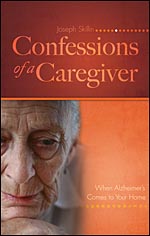Confessions of a Caregiver
A rare and honest look from a male caregiver’s point of view

After Alzheimer’s struck his mother, sister, and mother-in-law, author and caregiver, Joseph Skillin writes in Confessions of a Caregiver, that he struggles with the “daily-ness” of the presence of Alzheimer’s in his home.
He writes, “Anyone can rise to the need of taking care of a sick parent. But it takes courage, endurance, constancy, perseverance, and heroism to commit to daily care without any end in sight.”
While he admires his wife’s loving care for her mom in their home, he confesses his feelings of unease with the burden on his family.
IRRITATED BY THE LITTLE THINGS
Skillin finds he can’t stop focusing on “the little things” that irritate him day after day. He admits it doesn’t make sense to let these things bother him, but they do–such as when his mother-in-law turns up the volume on the television, doesn’t push in her chair when leaving the table, or never shows appreciation with a “Thank you.”
Yet, while his wife, Penny, serves as the primary caregiver for her mom, Skillin finds ways to help and ease Penny’s burden by taking on a greater share of the household chores.
PRAYING
One of two unique qualities of Confessions is a prayer at the end of each chapter. These give us a deeper look into what matters to Skillin during his caregiving journey. At the end of the “How I Cope” chapter, Skillin begs God: Do not test my endurance. Give me a break.
GETTING AWAY FROM HOME
Skillin, who works outside the home as a marketing consultant, is thankful Penny allows him time away from home to cope with the burden. He advises caregivers to do the same in order to “reset your perspectives, rekindle your appreciations, and recharge your soul.” He adds, “Step out of the house so you can step back in and step up to the challenges.” This is great advice for all caregivers if even for five minutes.
WHAT I FEAR
The second unique quality of Confessions, among caregiving books, includes a chapter on “What I Fear.” After seeing his mother, sister, and now mother-in-law live with Alzheimer’s, he knowingly fears of being robbed of his being, of his “eventual lack of control,” and of being “stuck in bed until someone comes and dresses” him. At the same time, he doesn’t want to be a burden to his children who he believes have to live their own lives. He even outlines eight tips for them.
FINDING THE JOY
Despite the burdens of caregiving, Skillin does take time to find the joy with his mother-in-law. Whether it is laughing at the thought of a ninety-four year old woman walking down the street with an empty suitcase at three in the morning (she wanted to go home) or smiling at the thought of his mother-in-law sipping out of the empty envelop she insisted was her coffee cup.
WHAT MATTERS MORE
Skillin comes to the realization while witnessing one’s dying that what matters less is success and competence and what matters more is significance and character.
He learns from his wife, Penny of the gifts of caregiving and why she sacrifices so much to lovingly tend to her mother. Among the reasons she gives is one that is important for all caregivers: To do the best we can so that after our loved ones are gone we have no regrets.
He wrote this book to help other caregivers and spouses of caregivers deal with the “emotional rollercoaster” of caregiving.
What Skillin accomplishes with Confessions of a Caregiver is a catharsis of sorts that gives caregivers the permission to feel negative feelings that come with the heroic burden of caregiving while stepping up to the caregiving role.
Reviewed by Brenda Avadian, MA on February 13, 2010








